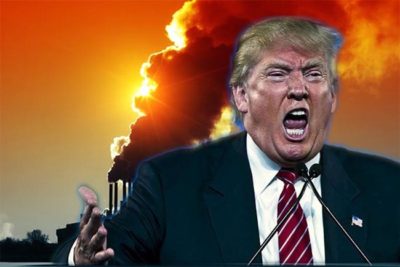What Do We Really Gain If the U.S. Stays in the Paris Agreement?
As Long As Trump Is President
 (This post is cross-posted at https://takecareblog.com/blog/what-do-we-really-gain-if-the-u-s-stays-in-the-paris-agreement.)
(This post is cross-posted at https://takecareblog.com/blog/what-do-we-really-gain-if-the-u-s-stays-in-the-paris-agreement.)
The Trump Administration will apparently decide soon whether to keep the United States as a party to the Paris Agreement. Although I understand why so many observers have argued that the U.S. should remain in Paris, I have already expressed my view that remaining in Paris is at best a symbolic gesture. At worst, I fear that Trump will gain valuable public credibility – both globally and domestically – by using that fairly insubstantial gesture as a fig leaf to obfuscate the tremendous damage his policies are doing to overall climate progress. If he withdraws, by contrast, his actions may galvanize a public response far more powerful and influential than any small gain the global community will experience if the U.S. remains in. As a result, the U.S. might be better off if Trump withdraws.
Most of the arguments in favor of remaining in Paris are really just arguments that climate change is a hugely important issue that requires urgent action and U.S. leadership (see, for example, the arguments of a number of large U.S. corporations and a recent Washington Post editorial by Obama climate envoy Todd Stern). I wholeheartedly agree that climate change is hugely important and needs U.S. leadership.
But the Trump Administration has made amply clear that it disagrees with this fundamental proposition. It is rolling back climate regulations, proposing funding cuts that decimate EPA and the Green Climate Fund, and cutting the entire U.S. contribution to the international climate negotiations budget. Over the last week, the Administration has fired a dozen scientific advisors to EPA and systematically dismantled EPA websites that contain information about climate change.
What, exactly, do we gain if Trump stays in? Ivanka Trump and Jared Kushner will feel empowered. Diplomatically, however, it’s hard to see how remaining in the agreement improves our global standing. By rolling back our commitments under Paris even while remaining in, as many observers are urging, the U.S. would have zero credibility to urge other countries to maintain or strengthen their commitment to cutting greenhouse gases. In or out, Trump has made clear that climate change is not a U.S. priority. So what does a seat at the table provide us? At least one commentator has argued that the U.S. might use its seat at the table under the Trump regime to weaken transparency rules. And given the proposed budget cuts at the State Department, our representation would be skeletal at best, as it is this week in Bonn, where we have 7 U.S. representatives while Algeria has 14.
I should be clear, however, that my argument does not extend to withdrawing from the overarching treaty that governs climate change, the U.N. Framework Convention on Climate Change. The UNFCC was enacted in 1992 and ratified by the U.S. Senate the same year. It is the treaty under which the Paris Agreement was negotiated. Unlike the UNFCC, the Paris Agreement was neither submitted to nor ratified by the U.S. Senate. Instead, the Obama Administration joined it under its executive authority. If Trump attempts to withdraw the U.S. from the UNFCC entirely (something that would raise complex legal questions about whether he needs Senate agreement to do so), then once he leaves office, the U.S. would need to rejoin the UNFCC and the Senate would need to re-ratify it. It is not at all clear that the Senate would do so since treaty ratification takes a 2/3s vote. If, by contrast, Trump withdraws only from Paris, the U.S. can likely re-join the agreement by a relatively straightforward process known as accession. Unfortunately, withdrawal from the UNFCC takes only a year whereas withdrawal from Paris takes three years. A third alternative is that Trump could simply announce his attention not to comply with the commitments the Obama Administration made under Paris but avoid formally withdrawing from either treaty.
If Trump chooses to withdraw from Paris, either formally or not, imagine the public response. Our allies will be furious. Domestic reaction from environmentalists, many in the business community, Democrats and even some prominent Republicans will be fierce and negative. Voters who care about climate change will be galvanized. The pressure to acknowledge and actually do something about climate change will increase. If we remain in the agreement, by contrast, the international community and domestic constituencies will breathe a huge sigh of relief. And Trump will continue to decimate policies to reduce emissions and funding for climate and global assistance while using the fig leaf of Paris to cover his actions.
Reader Comments
2 Replies to “What Do We Really Gain If the U.S. Stays in the Paris Agreement?”
Comments are closed.







I realize I may be an outlier on this; but, the only good I see coming from the U.S. continuing to occupy space at the table accrues to the Trump administration. It’s not as if the administration intends to honor Obama’s commitments.
Should the decision be to remain, Trump will claim he has always been and environmentalist and perhaps succeed in fooling some of the people at least some of the time.
I understand others are hoping that by keeping the company of climate defenders Trump and his key advisors will come to believe climate change is real and must be aggressively combated.
This might be called the “company you keep” theory of conversion. My opinion on that: it’s a load of ***. It has as much chance of succeeding as my becoming a Prius simply by standing next to one.
Conversion by osmosis doesn’t happen in the real world. The denier’s chorus has already indicated nothing will convince them that the Earth is under threat by anything we do.
Trump’s decision to stay at the table in Paris, while doing next to nothing at home, is a win-win for Trump.
Staying is the hollowest of gestures, as long as Trump continues to dismantle the regulatory and programmatic means for the federal government to combat climate change. Remaining at the table is outright hypocrisy.
Worst of all it will slow down other nations, which for deniers is victory. A recent G-7 meeting was a glimpse into the future. Six of the seven nations were ready to do something positive and Secretary Perry said sorry guys, we’re still thinking about it.
The consequence of Perry’s inaction was the re-commitment letter by G-7 nations was never issued. Keeping the rest of the world in limbo, while the Trump administration fiddles around. Trump’s delaying tactics adds insult to the injury already being inflicted by de-regulation and de-funding–including the recent announcement that the U.S. will no longer contribute to the UN Green Climate Fund.
Anne said;
“…..If Trump chooses to withdraw from Paris, either formally or not, imagine the public response. Our allies will be furious….”
Dear Anne,
President Trump is not the major obstacle facing the Paris climate treaty. Instead it is the lack of credibility and public fraud that has come to characterize the American climate movement. We know that reducing carbon dioxide emissions has no effect on global climate and never will.
Climate mitigation does not work and there is no interest among climate zealots to convince us otherwise. There is no scientific proof to support their preposterous claims about climate mitigation.
The general public is sick and tired of the lies and rip-off from the climate movement and President Trump merely reflects what we all know to be true. The only hope for the climate movement is hard, incontrovertible proof that so-called climate “mitigation” is actually effective and not a waste of public money and resources (but this will never happen so there is no hope).
The climate movement is almost dead but continues to survive among small pockets of desperate academics who see their funding slipping away. The climate movement failed because it is corrupt and dishonest, not because of Trump.